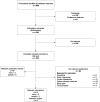Targeted antenatal anti-D prophylaxis for RhD-negative pregnant women: a systematic review
- PMID: 32033599
- PMCID: PMC7006196
- DOI: 10.1186/s12884-020-2742-4
Targeted antenatal anti-D prophylaxis for RhD-negative pregnant women: a systematic review
Abstract
Background: All non-sensitized Rhesus D (RhD)-negative pregnant women in Germany receive antenatal anti-D prophylaxis without knowledge of fetal RhD status. Non-invasive prenatal testing (NIPT) of cell-free fetal DNA in maternal plasma could avoid unnecessary anti-D administration. In this paper, we systematically reviewed the evidence on the benefit of NIPT for fetal RhD status in RhD-negative pregnant women.
Methods: We systematically searched several bibliographic databases, trial registries, and other sources (up to October 2019) for controlled intervention studies investigating NIPT for fetal RhD versus conventional anti-D prophylaxis. The focus was on the impact on fetal and maternal morbidity. We primarily considered direct evidence (from randomized controlled trials) or if unavailable, linked evidence (from diagnostic accuracy studies and from controlled intervention studies investigating the administration or withholding of anti-D prophylaxis). The results of diagnostic accuracy studies were pooled in bivariate meta-analyses.
Results: Neither direct evidence nor sufficient data for linked evidence were identified. Meta-analysis of data from about 60,000 participants showed high sensitivity (99.9%; 95% CI [99.5%; 100%] and specificity (99.2%; 95% CI [98.5%; 99.5%]).
Conclusions: NIPT for fetal RhD status is equivalent to conventional serologic testing using the newborn's blood. Studies investigating patient-relevant outcomes are still lacking.
Keywords: Benefit assessment; Fetus; Genotyping techniques; Rh-Hr blood-group system; Systematic review.
Conflict of interest statement
The authors declare no competing interests.
Figures
References
Publication types
MeSH terms
Substances
LinkOut - more resources
Full Text Sources
Medical



